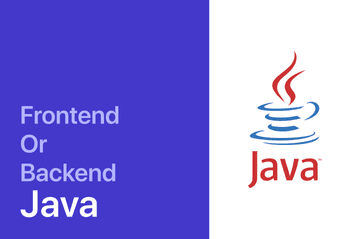Is Java for Front-End or Back-end Development?

Get the latest frontend development resources delivered straight to your inbox for free.
Explore our latest issue for a sample.
🚀 The Complete Web Developer in 2024
As a beginner in web development, the number of programming languages and frameworks might look overwhelming at first. But don't worry. It will become very easy when you understand the core concepts and what each thing is used for.
Java is one of the most popular programming languages, But is Java for frontend or backend? Let's find out!
Frontend vs Backend: What Is the Difference?
Before diving into where Java is most used, you need to understand the difference between frontend and backend for web development.
A simple way to explain the difference between the two is that frontend is everything on the user side. Things users interact with.
On the other hand, the backend is everything that goes on behind the scenes. It is not visible to the user.
So, backend applications and processes like servers and databases need to be incorporated to make a website functional and work well.
Is Java for Frontend or Backend?
Now, here is the question, is Java good for the frontend or backend? Since the server-side needs to work efficiently with no errors, Java is mostly used for backend applications. It deals with the functional logic and technical aspects we already mentioned.
The frontend and backend use different programming languages to make them work. In the frontend, you will mostly work with HTML, CSS, JavaScript.
It is a bit different for the backend since the backend needs to deal with server-side languages like Python, PHP, Ruby, and Java are used.
Compared to other languages like C++ and C, Java is more accessible. You will learn it easier than others and develop reliable backend applications. Other reasons that make Java so popular for the backend are:
Security
Java is one of the most secure server-side languages you can use to this day. A large list of API tools, security algorithms, and protocols makes it robust and secure. The API includes crucial things like cryptography and public key infrastructure.
Multi-Threading
Since Java uses multi-threading, you can do CPU-intensive tasks much more efficiently. It uses a separate thread to process each request. It means that the tasks do not stack up if they do not get queued.
It is important in things like video streaming, editing, and more. So, efficient and fast applications can be made with Java.
Cross-Platform and Rich Ecosystem
With Java, you can write the code once, and it can run on different operating systems like macOS, Windows, or Linux.
The availability of frameworks also makes the ecosystem very rich. It is a very mature programming language. So, you get all the advantages that come with that, like great support and awesome tools.
Is Java the Same as JavaScript?
Many people, especially beginners, might confuse JavaScript as same as Java. However, these two are very different.
Here are some of the key differences:
- Java is a compiled language while JavaScript is an interpreted language.
- Java is static (the type of each variable must be defined explicitly).
- JavaScript is dynamic (the type of variables is inferred at runtime).
- Java is strongly typed (does not do type conversion implicitly).
- JavaScript is weakly typed (does type conversion implicitly).
- JavaScript is the only language that can run in all browsers while Java is not supported by them.
- Both are object-oriented. Java uses classes, JavaScript uses prototypes (although it now also supports classes).
Why Does JavaScript Have Java in The Name?
Despite having very different use cases, both programming languages share Java's name. JavaScript was not originally named like this. When Netscape first developed it, it was called Mocha. It was then renamed LiveScript. And later, when Netscape and Sun Microsystems got together, the programming language went through another name change.
It is called by the name we know it as today – JavaScript. The idea was to make it a complementary language to Java since it was so popular. Some speculate that JavaScript got its name as a marketing ploy for the sole reason that Java was so popular. Regardless of the reason, both languages are mature and popular in their own right.
Wrapping Up
So, is Java for frontend or backend? By now, it should be clear that Java is for the backend. The ability to create fully integrated desktop-grade apps and secure, reliable backend applications makes it one of the best backend languages to use.
If you have a passion for web development, stay tuned with Frontend Planet. We frequently publish new content on frontend development to help developers as you stay updated with the latest information on all things frontend. Thanks for stopping by.